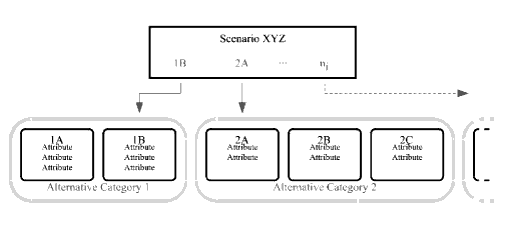A Familiar Parallel
Although the structure of scenarios may seem a bit difficult at first, if you have ever eaten at a restaurant, you should be able to understand the concept. A meal (scenario) is comprised of several courses (alternatives), which might include a salad, an entrée, and a dessert. Each course has its own attributes. For example, the entrée may have a meat, a vegetable, and a starch. Examining the choices, we could present a menu as in the following figure:
The restaurant does not have to create a new recipe for every possible meal (combination of courses) that could be ordered. They can just assemble any meal based on what the customer orders for each alternative course. Salad 1, Entrée 1, and Dessert 2 might then be combined to define a complete meal.
Generalizing this concept, we see that any scenario references one alternative from each category to create a big picture that can be analyzed. Different types of alternatives may have different numbers and types of attributes, and any category can have an unlimited number of alternatives to choose from.
Generic Scenario Anatomy


